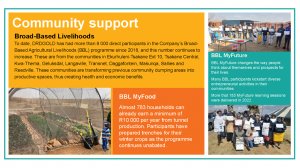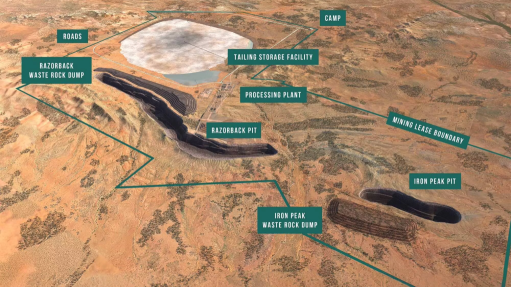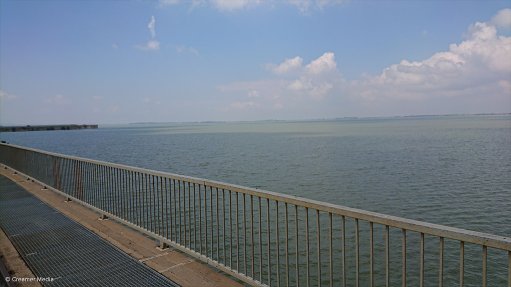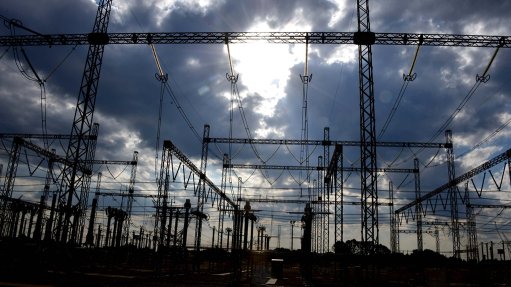DRDGold's livelihoods initiative attracts 8 000-plus direct participants

DRDGold CEO Niël Pretorius interviewed by Mining Weekly's Martin Creamer. Video: Shadwyn Dickinson.
JOHANNESBURG (miningweekly.com) –The livelihoods initiative introduced by surface gold mining company DRDGold has to date attracted more than 8 000 direct participants at a time when boosting jobs and livelihoods in South Africa has never been more important
The broad-based livelihoods (BBL) programme of the Johannesburg- and New York-listed company headed by CEO Niël Pretorius has been directed at communities on the East Rand and Far West Rand where DRDGold recovers gold from mine waste dumps.
More than 780 households are already able to earn a minimum of R10 000 a year from growing food.
“The answer to South Africa's poverty issues lies in developing the informal economy, and that's where 100% of our focus lies,” Pretorius told Mining Weekly in a Zoom interview. (Also watch attached Creamer Media video.)
Younger people are scripting their own lives, with more than 180 MyFuture learning sessions delivered in the 12 months to June 30.
The focus of the BBL urban farming programme is to be able to grow food for a family of four on a piece of land the size of the door, and to do it sustainably going forward.
The next step from there is a slightly bigger tunnel, or shade cloth shaped in the form of a tunnel – a hydroponic tunnel.
Eventually, it can also become a business, which has happened in quite a number of cases.
The slightly different MyFuture programme. which goes beyond agriculture in outlining economic opportunities within the communities themselves, tends to attract younger people.
MyFuture participants also then go into agriculture, or pursue MyBusiness, which is more micro-business focused and teaches budgeting, money management and market analysis. Then there is MyLivestock, which has two components, one being rural, which mine employees from rural areas can take back home, and the other being urban community orientated, involving, for example, yard chickens and eggs, and other livestock aspects.
Mining Weekly: Why is it important to integrate the environmental, social and governance aspects in the ESG thrust, as DRDGold does?
Pretorius: It's essential. If you don't, your ESG is going to be an ESG parade. It's like marching through town and then afterwards, when people start losing interest, they move on to the next big thing. It will just disappear. We knew that sustainability and sustainable development was core to business success because we were doing business in close contact with communities and the environmental impacts would be felt by those communities, and unless they were dealt with properly, it was going to bring a premature end to our business. But because of where we are from – and remember not many years ago our market cap was less than the transfer fee of a good soccer player in the European league – we had to develop sustainability on a shoestring. We didn't have the funds to go and build independent silo initiatives. We simply had to do it on an integrated basis also because of the size of our footprint, and this is maybe more where the social development aspect came in, we were convinced, and we still are, that unless you improve the quality of life, or assist in improving the quality of life, of people in your areas of influence, then you're going to have a disgruntled and unhappy community, within which you need to operate the business – and remember, we're right in the middle of Johannesburg. But we couldn't build schools and infrastructure, hospitals and so forth. The only thing that we could do really was bring knowledge. So here's the knowledge, here's a bit of incentive, maybe a little bit of seed capital, but ultimately success depends on yourself.
On the environmental side, we knew that because of the size and the scale, if we didn't include the environment into our business plan, if it didn't become integrated as part of the business, it was going to become unaffordable. On the water side, for example, our grey water is more abundant, so better security of supply, but it's also cheaper. The same is now also going to apply in terms of the solar power that we intend generating going forward. It’s going to be cheaper, our carbon footprint is going to be smaller, and there’s going to be better security of supply.
Our ESG does not come at the cost of quality. It's not something that gets funded. We're not diluting shareholder return in order to fund ESG initiatives. Even in as much as it looks like cost alone, for example, the vegetation of tailings. Vegetation of tailings is such an integral part of our operating budget that it's unthinkable not to provide at least R80-million to R100-million a year for the vegetation of tailings, because we've been doing it for a decade. Up until five or six years ago, we spent more money on vegetating tailings than we distributed in dividends because we knew that if people had to wash their curtains two, three times a week, because of the dust blowing off tailings dams, at some point or another, we we're going to get stopped, so from a longer term sustainability perspective, it was essential that we became a good neighbour. We could feel sorry for ourselves and say that when these tailings dams were established, there weren’t any people. The people came to the mine, the mine didn't go to the city, but that's a poor excuse for people that have no other option, and you’ll get interfered with, you’ll get stopped. So, we adjusted our standards, spent money and, as a consequence, we now have longer term sustainability. We're a more welcome neighbour than what we were a decade ago. The short answer to your question is that our ESG does not come at the cost of quality. We're not diluting the legitimate expectation of our shareholders in funding this. ESG has become truly integrated into our business model.
Has President Cyril Ramaphosa's latest energy statement opened the way for DRDGold to expend its energy generation plans still further?
I saw a presentation many years ago by Frans Cronje, which showed the correlation between economic growth and the availability of power. There’s no doubt that the recent energy statement is probably one of the bravest and most valuable statements ever made by our President in opening this up. We also need to appreciate what it took to make this happen because remember, at the core, our ruling party is socialist and believes in centralised control. If you relinquish power over power, then you relinquish power over the economy, and centralised control is getting further and further away from your grasp, so I think it was a big, brave thing to do for the government, considering where they are ideologically, but it was essential. It will unlock this economy and you can see in the recent past, even people who really complained about everything and criticised government about everything and were prophets of doom, are saying maybe there are little flashes of hope also coming through the doom.
What, in your view, should be the biggest takeaway from DRDGold’s latest presentation of financial results for the 12 months to June 30?
The fact that we've been systematically investing in risk and that the results weren’t a consequence of decisions taken 18 months ago, but rather the consequence of decisions taken over 12, 13, 14 years ago to invest in very specific things that were risk-focused, like backup power and the clean and dirty water separation, and by making sure that we can always keep our business in motion. A lot has also gone into our staff, who know that our attitude is that if we all pull together, they can work until retirement, and that we’re genuinely interested in their future going forward. We were rewarded for that attitude during Covid, when asking for volunteers, we were oversubscribed. There are a whole host of things – the strategic decisions that were taken, the values that were developed, and allowing those values to be applied in the workplace. I don't think we taught anybody anything, we just allowed them to be themselves. But all of that has contributed towards a business that I think is stable, towards a team that is confident, without being arrogant. I think there's a good combination of humility and confidence, and having invested in the things that you need to invest in, in order to make it work in this environment. The mechanisation, the access to water, the backup power. Because we had invested all of this money into environmental containment, for example, if there's a bit of a cash squeeze, we could defer some of those expenses for a period of time, and nobody would be the wiser because the impact wouldn’t be felt. But that's not because of what we did last year, that's because there's been a programme running for the last decade. The fruits of, I think, good governance over a period of ten years. There are some very clever people working in this company that have taken those decisions, that have executed them and now we’re benefiting from it.
Article Enquiry
Email Article
Save Article
Feedback
To advertise email advertising@creamermedia.co.za or click here
Press Office
Announcements
What's On
Subscribe to improve your user experience...
Option 1 (equivalent of R125 a month):
Receive a weekly copy of Creamer Media's Engineering News & Mining Weekly magazine
(print copy for those in South Africa and e-magazine for those outside of South Africa)
Receive daily email newsletters
Access to full search results
Access archive of magazine back copies
Access to Projects in Progress
Access to ONE Research Report of your choice in PDF format
Option 2 (equivalent of R375 a month):
All benefits from Option 1
PLUS
Access to Creamer Media's Research Channel Africa for ALL Research Reports, in PDF format, on various industrial and mining sectors
including Electricity; Water; Energy Transition; Hydrogen; Roads, Rail and Ports; Coal; Gold; Platinum; Battery Metals; etc.
Already a subscriber?
Forgotten your password?
Receive weekly copy of Creamer Media's Engineering News & Mining Weekly magazine (print copy for those in South Africa and e-magazine for those outside of South Africa)
➕
Recieve daily email newsletters
➕
Access to full search results
➕
Access archive of magazine back copies
➕
Access to Projects in Progress
➕
Access to ONE Research Report of your choice in PDF format
RESEARCH CHANNEL AFRICA
R4500 (equivalent of R375 a month)
SUBSCRIBEAll benefits from Option 1
➕
Access to Creamer Media's Research Channel Africa for ALL Research Reports on various industrial and mining sectors, in PDF format, including on:
Electricity
➕
Water
➕
Energy Transition
➕
Hydrogen
➕
Roads, Rail and Ports
➕
Coal
➕
Gold
➕
Platinum
➕
Battery Metals
➕
etc.
Receive all benefits from Option 1 or Option 2 delivered to numerous people at your company
➕
Multiple User names and Passwords for simultaneous log-ins
➕
Intranet integration access to all in your organisation


















